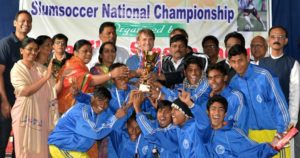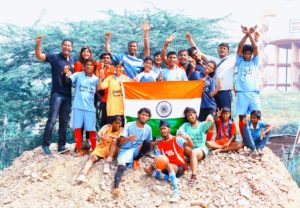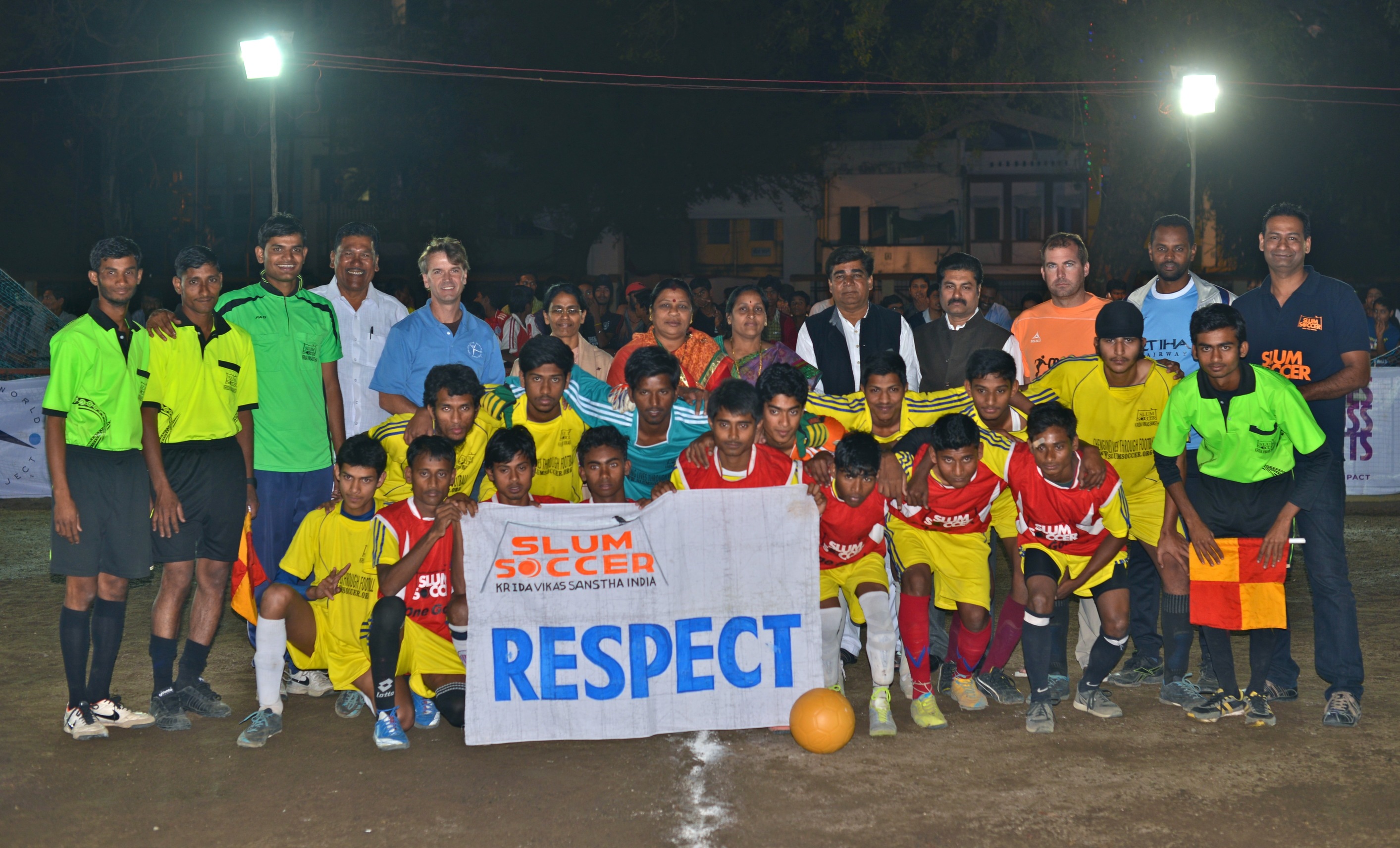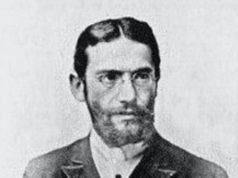26th September 2016. It was a packed house in Soccerex Global Convention held in Manchester, United Kingdom. It was the day when FIFA was going to announce the winner of its inaugural Diversity Award.  International Gay & Lesbian Football Association (IGLFA), which promotes and fosters the worldwide growth of football for lesbians, gays, bisexuals and transsexuals (LGBT) and Kick It Out of England which enables, facilitates and communicates to tackle all forms of discrimination through football, were the two strong contenders for the award. But nobody noticed the other nomination, an organization from India represented by their CEO Abhijeet Barse. Slum Soccer, an NGO from Nagpur, eventually won the Diversity Award for using football to connect individuals, teach life skills and work towards improving the living conditions of women and marginalised populations in Indian society.
International Gay & Lesbian Football Association (IGLFA), which promotes and fosters the worldwide growth of football for lesbians, gays, bisexuals and transsexuals (LGBT) and Kick It Out of England which enables, facilitates and communicates to tackle all forms of discrimination through football, were the two strong contenders for the award. But nobody noticed the other nomination, an organization from India represented by their CEO Abhijeet Barse. Slum Soccer, an NGO from Nagpur, eventually won the Diversity Award for using football to connect individuals, teach life skills and work towards improving the living conditions of women and marginalised populations in Indian society.
Slum Soccer was formed as ‘Jhopadpatti Football’ by Abhijeet’s father Vijay Barse in 2001. A local sports teacher of Nagpur, Barse was toying with the idea of bridging the gap between children from slums and those from regular homes when suddenly on a rainy day, he found a group of underprivileged children kicking and passing a broken bucket on a muddy lane.  The search for a medium was over and he zeroed on Football to break the hurdles of race, religion, language and gender. In a few days he went to a slum and organized a match by forming two groups with the children living there. This match was the first one for Jhoradpatti Football that was followed by an inter-slum city tournament comprising of 128 teams. The response was overwhelming as Vijay Barse witnessed some 90-minutes of social emancipation in the form of football. Next he spread the tournament regionally, then nationally and ultimately formed Slum Soccer to bring those youngsters, coming from background of poverty, anti-social activity, drug abuse or alcohol addiction, to a state of self-belief.
The search for a medium was over and he zeroed on Football to break the hurdles of race, religion, language and gender. In a few days he went to a slum and organized a match by forming two groups with the children living there. This match was the first one for Jhoradpatti Football that was followed by an inter-slum city tournament comprising of 128 teams. The response was overwhelming as Vijay Barse witnessed some 90-minutes of social emancipation in the form of football. Next he spread the tournament regionally, then nationally and ultimately formed Slum Soccer to bring those youngsters, coming from background of poverty, anti-social activity, drug abuse or alcohol addiction, to a state of self-belief.
Presently, almost 10,000 players from various slums play in Slum Soccer tournaments every year. Many play for national level competitions and represent India in international tournaments also. Since 2007, Slum Soccer has sent teams to the Homeless World Cup, an annual contest that has teams from more than 70 countries. But from being an organizer of football tournaments,  Slum Soccer has matured itself into a change agent for the underprivileged with its intensive training programmes and innovative socio-economic projects. The likes of Pankaj Mahajan whose grown-up days had witnessed daily domestic violence or Homkant Surandase who ran away from a remote village where farmers commit suicide, has had a sharp turn in their destiny when they came across Slum Soccer. They were picked up by the volunteers and were given a new lease of life first by making them play football and then involving them in the projects of the organization. Pankaj now heads the Shakti project and Homkant is one of the coaches of the organization. As Abhijeet Barse says, “Our main aim is to involve them more in the field because that is the actual time when they are away from all negative activities. We use football as a mean to bring them under one roof from where they start to work on some greater aspects of life.”
Slum Soccer has matured itself into a change agent for the underprivileged with its intensive training programmes and innovative socio-economic projects. The likes of Pankaj Mahajan whose grown-up days had witnessed daily domestic violence or Homkant Surandase who ran away from a remote village where farmers commit suicide, has had a sharp turn in their destiny when they came across Slum Soccer. They were picked up by the volunteers and were given a new lease of life first by making them play football and then involving them in the projects of the organization. Pankaj now heads the Shakti project and Homkant is one of the coaches of the organization. As Abhijeet Barse says, “Our main aim is to involve them more in the field because that is the actual time when they are away from all negative activities. We use football as a mean to bring them under one roof from where they start to work on some greater aspects of life.”
Slum Soccer’s journey has been an enthralling one and it turned to be exciting when it succeeded in breaking the gender barrier and bringing the slum girls onto the field. Abhijeet, a Post Doctorate Fellow, left his prosperous career in the USA to aptly support his father in this success story. It was a tough job to persuade the parents to send their girls to play football rather than doing household chores or earning money working as maids. It was only after systematic local activities, regular visits of coaches and even demonstrating study modules through football, the parents were convinced. Now Slum Soccer’s initiative has broken all the obstacles for the slum girls as they get equal opportunity to play and brush their shoulders along with the boys in many football matches. The girls’ team too, like the boys, represents India in Homeless World Cup.
Sajid Jamal, an electronics engineer by profession  but a Slum Soccer volunteer by choice has helped the organization to grow further when he broke the religious obstacle and brought many Muslim girls to play from his remote village of Kamti. He demonstrated his Edukick project in his own village to make the parents understand that it is not just football that they would be playing but through it the girls would also develop their academics. Sajid proudly says, “I am one of them, so perhaps it was easier for me to convince them and I am glad that I could bring a social change. My aim is to work more and more and bring changes in the society through football.”
but a Slum Soccer volunteer by choice has helped the organization to grow further when he broke the religious obstacle and brought many Muslim girls to play from his remote village of Kamti. He demonstrated his Edukick project in his own village to make the parents understand that it is not just football that they would be playing but through it the girls would also develop their academics. Sajid proudly says, “I am one of them, so perhaps it was easier for me to convince them and I am glad that I could bring a social change. My aim is to work more and more and bring changes in the society through football.”
There are many children whose lives are in a constant curve. Those children get a life-changing direction in Slum Soccer. It brings change, a change that has a permanent effect in the lives of many hundred people. And what is a society without a change?




